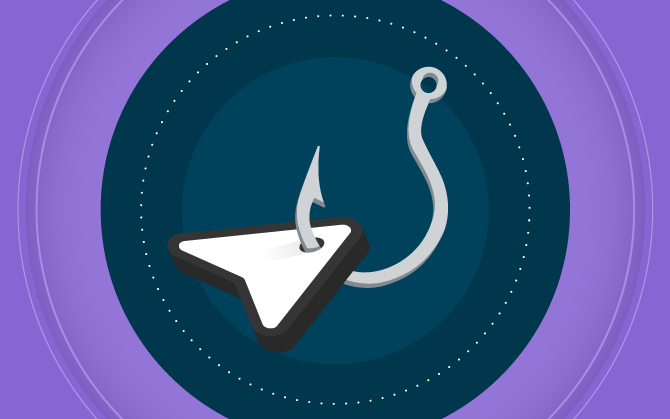
Find out what Clickbaits are and why you should avoid using them
Making miraculous promises and using sensationalistic calls might attract a lot more clicks, but the consequences can be quite negative. Find out why you should avoid using clickbaits.

What will we see in this post
Have you ever come across a social media post, video or an email promising to solve all of your problems, such as a miraculous formula for getting rich, losing weight in a few days or even a revolutionary new product?
May those that have never stopped what they were doing, and have clicked on a link to check out an irresistible offer, only to realize the content didn’t fulfill the promise made in the title, cast the first stone.
Believe me, this is more common than it seems, and everyone has been through this situation at least once.
During these times, we feel that we were baited by an irresistible lure. And this temptation is called clickbaiting.
In today’s article, you’ll learn more about this common practice in the digital environment, and why you should avoid using it in your marketing strategies. Shall we get started?
What is clickbaiting?
Does the name sound strange? Relax; you’ve probably seen several clickbaits online. Perhaps, you’ve even been a victim of a few.
Clickbaits are content that makes exaggerated and miraculous promises to entice users to follow the link to a certain webpage.
This type of content generally “baits” the audience’s attention with enticing and sensationalistic titles and calls, such as “You won’t believe this”, or “You’ll never figure out what happened”.
However, clickbaits never fulfill their promises and lie to users.
Clickbaits work like fishing lures. They promise a secret or a miraculous solution to a problem. This way, readers feel “hooked” and don’t think twice about clicking on the content.
Many people, especially small businesses, trying to obtain instant results, tend to use clickbaits because it’s an extremely fast way of generating online traffic. And with more traffic, you get more potential customers and therefore, more sales.
The problem is that, since the promises made in the title are almost never fulfilled, these users feel cheated and abandon the brand.
Why clickbaits work
If clickbaits consist of using sensationalistic and misleading wording to attract clicks and traffic, why are there still people who allow themselves to be fooled? And why are there companies and professionals who still insist on using them?
It’s quite simple. Clickbaits use a number of features that attract the audience’s attention in an irresistible manner.
They exploit feelings we all have and that are irrational. Among these features are:
- Fears that their customers might have
- The desire for a product or goal that hasn’t been achieved
- A pain or difficulty faced by consumers
- Curiosity.
Additionally, it’s also quite common for clickbait calls to overuse mental triggers. This attracts the readers’ attention even further, making it practically impossible to resist and not click on the link.
In other words, although it’s a reprehensible practice, clickbaits end up leading to an increase in traffic. But, as you’ll see later on, they’re not worth it.
Most common examples of clickbaiting on the internet
Everybody has seen or fallen for a clickbait at least once. Therefore, it’s not very hard to recognize this type of content.
Overall, clickbaits have certain common characteristics, such as:
Misleading information
Here, we have content that presents misleading information to deceive users intentionally.
In this category, we can include fake news, which have misleading titles and content to misinform, create commotion and engagement among the audience.
We can also highlight content with incorrect information in the title with the sole purpose of generating clicks. Most of the time, this information has no connection with the rest of the material, deceiving the users who access it.
Repeated information
This is another common strategy used by clickbait creators. Users become interested in the call, click it and, when they access the content, realize that all the information is merely copies of other materials.
They consist of repetitions of the same information from other websites and companies, usually with the same title, but worded differently.
This type of content, in addition to deceiving the audience, also constitutes plagiarism, which infringes copyrights on the internet and may result in penalties.
Incomplete information
This is another strategy that is widely used by those who are after clicks and money with online advertising, is to post summarized or incomplete information about content they find on other websites or channels.
This attitude also shows the company’s lack of commitment with the information itself and also with its audience.
Exaggerated information
Many online pages and businesses fill their calls with expressions, such as “the best”, “the greatest”, “the most recommended”, among others, to convey the impression of having greater authority and generating traffic.
But instead of offering truly proven information, they merely use these expressions to pique the audience’s curiosity. Users click on the link expecting to find the best solution, with information that ensures its effectiveness, but in the end, they are deceived.
Why you shouldn’t use clickbaits
Now that you understand how clickbaits work in practice (and also from your own experience with this type of content), you probably already know that using them isn’t worth it.
However, to put an end to any doubts you might have, we’re going to show you what can happen if you decide to use a clickbait to attract more traffic.
You’ll be lying to your audience
The cornerstone of digital marketing is delivering relevant content to your audience, something that helps them solve the problems they face on a daily basis. This strengthens people’s relationship with brands, generating authority and facilitating sales.
But you won’t be able to do this if your strategy is based on lies or incorrect information. You’ll be promising solutions that, in the end, you won’t deliver.
Not only is it unethical to deceive people, you might put your brand’s reputation in jeopardy. Just imagine being known in the marketplace as a deceitful business, who makes and doesn’t deliver on the promises made. Pretty bad, right?
Results can be disappointing over time
At first, your blog or YouTube channel might gain tens, hundreds or even thousands of new accesses. All thanks to the use of clickbaits.
This sounds great, right? Well, not so much…
Your content might be popular at first, but as the audience starts noticing that you’re using clickbaits, hits may plummet, your page’s reputation may suffer and you might be penalized by search engines.
In the end, there’s no use in having millions of hits if none of these visitors are converted into leads or customers.
You might lose potential customers
Every digital strategy, in order to be successful, needs to take the users’ experience into account from the moment they get to know the brand for the first time to the conclusion of the purchase.
Therefore, if those who visit your blog, website or YouTube channel come across a clickbait or feel deceived, they’ll probably associate your business with a negative experience.
And when this happens, you run the risk of losing valuable business opportunities. And even worse, put your business at risk.
Abandon clickbaiting!
As we’ve seen, the practice of clickbaiting is very detrimental to your business’ marketing strategy. When you lie to your audience and don’t deliver what you have promised, you run the risk of tarnishing your brand’s image and of losing potential customers.
Therefore, it’s very important that you provide the best possible experience. Review your content to make sure that all promises made are kept and that those who access your content won’t be disappointed.
Although you might be tempted to use clickbaiting to attract the attention of internet users and obtain more clicks and traffic, other techniques are much more efficient. And best of all, they are honest. One of them is copywriting.
Would you like to learn how to write texts that sell? Well then, check out our full article on this topic.





